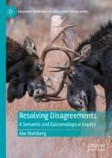Search
Search Results
-
Grice and Kant on Maxims and Categories
Apart from a passing reference to Kant, Grice never explains in his writings how he came to discover his conversational maxims. He simply proclaims...
-
Grice’s Inferential Model
The code model is grounded on a certain idea of what it is for something to have meaning. This is the idea that meaning something is just...
-
Self-awareness, Language, and Empirical Knowledge
I argue that the evolution of language had a huge influence on human knowledge and that much of our experiential knowledge evolved into empirical...
-
The Non-saying of What Should Have Been Said
According to Grice’s analysis, conversational implicatures are carried by the saying of what is said (Grice 1989: 39). In this paper, it is argued...
-
Pragmatics, Metaphor Studies and the Challenge of Mental Imagery
In this paper we will discuss how pragmatics (from Grice to Relevance theorists) has considered the relationship between mental imagery and metaphors...
-
Natural Meaning and the Foundations of Human Communication: A Comparison Between Marty and Grice
Several authors have noted the proximity of Marty’s and Grice’s ideas. Both Marty and Grice distinguish natural meaning and the sort of meaning...
-
Disagreement and Meaning
This chapter approaches the notion of disagreement from the perspective of semantics and the philosophy of language. It first provides a semantic...
-
The truth conditions of sentences with referentially used definite descriptions
Keith Donnellan’s distinction between the attributive and referential uses of definite descriptions has spurred debates regarding the truth...
-
A unified account of information, misinformation, and disinformation
In this paper I develop and present a unified account of information, misinformation, and disinformation and their interconnections. The unified...

-
Metaphor in Pragmatics: Literal Meaning, Metaphorical Meaning and Other Dangerous Things
This chapter responds to criticisms of Conceptual Metaphor Theory by offering an alternative framework for the construction of metaphorical meaning....
-
Relevance Theory
According to the Gricean model, communicative practices hinge on the recognition of intentions rather than the codification and decodification of...
-
Ordinary Language Philosophy
Der frühe W. wurde ursprünglich zusammen mit Gottlob Frege, Bertrand Russell, Rudolf Carnap und Willard Van Orman Quine der ideal language philosophy...
-
In Conversation with Artificial Intelligence: Aligning language Models with Human Values
Large-scale language technologies are increasingly used in various forms of communication with humans across different contexts. One particular use...
-
Alienation or regress: on the non-inferential character of agential knowledge
A central debate in philosophy of action concerns whether agential knowledge, the knowledge agents characteristically have of their own actions, is...
-
Behavior, valuation, and pragmatism in C.I. Lewis and W.V. Quine
I explore three points about the relationship between C.I. Lewis’s conceptual pragmatism and W.V. Quine’s naturalized epistemology inspired by Robert...
-
On the Conventional Nature of Illocutionary Acts: Uptake, Conventions, and Illocutionary Effects
Contrary to most speech acts theorists, Sbisà’s reading of Austin rightly emphasizes the conceptual, or “internal,” link between the necessity of...
-
Christian physicalism and the biblical argument for dualism
This paper examines whether biblical descriptions of the intermediate state imply dualism of the sort that rules out physicalism. Certain passages in...
-
Disagreement and Belief I: Puzzles About Disagreement
This chapter is dedicated to an inquiry into the nature of belief insofar as this nature is relevant to our understanding of disagreement. It first...
-
Beyond the Meaning of Words: Issues in Neuropragmatics, Clinical Pragmatics and Schizophrenic Language
Over the last decades, theoretical and empirical evidence, first provided by language pragmatics and then by clinical pragmatics and neuropragmatics,...
